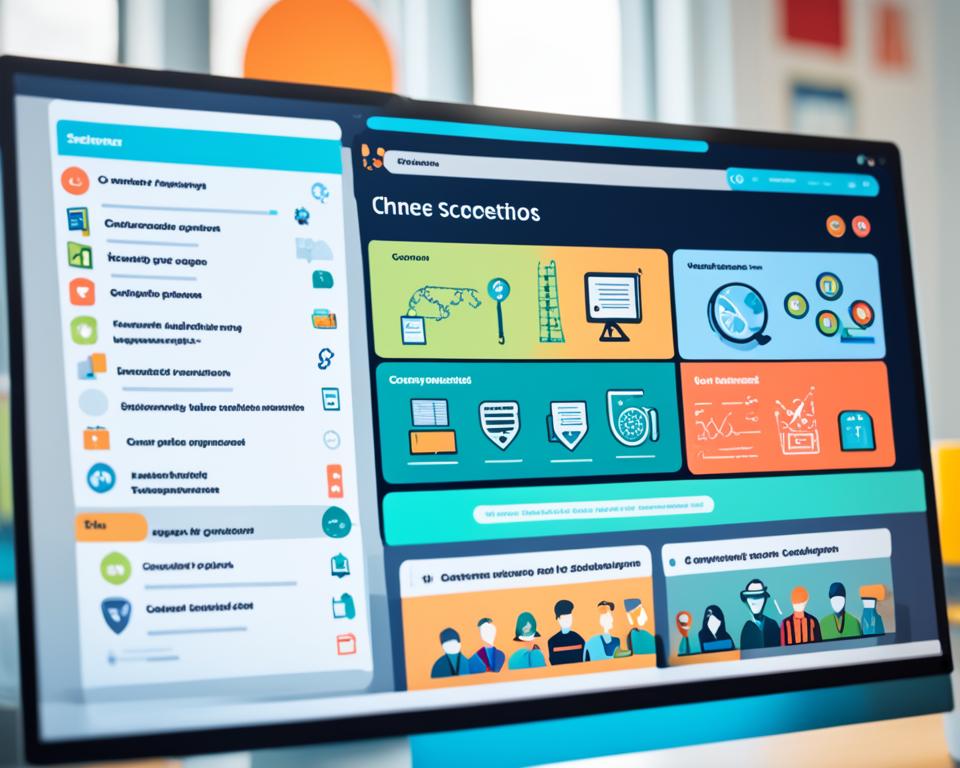Online learning has become increasingly popular as a convenient and flexible method of education. There are numerous online education platforms available, each with its own unique features and benefits. In this article, we will explore the top online education platforms, including e-learning platforms, virtual learning environments, and distance learning platforms. We will provide detailed descriptions, pros and cons, pricing information, and recommendations for the best use cases.
Key Takeaways
- Online education platforms offer a convenient and flexible method of learning.
- There are various types of online education platforms available, including e-learning platforms, virtual learning environments, and distance learning platforms.
- Each online education platform has its own features, pros and cons, and pricing structure.
- Consider your specific needs and use cases when choosing the best platform for your online learning journey.
- In this article, we will provide detailed descriptions and recommendations for the top online education platforms.
What is an Online Learning Platform?
An online learning platform is a digital space where course creators can market, sell, and deliver their eLearning courses. These platforms, also known as online course marketplaces, offer a wide range of features to enhance the learning experience.
“Online learning platforms provide a safe and interactive environment for learners to access course materials and interact with teachers and other students.”
With online learning platforms, learners have access to a variety of resources such as lectures, assignments, quizzes, and completion certificates. These platforms foster virtual classrooms where students can engage with course material and collaborate with peers.
Course creators also benefit from online learning platforms as they provide tools to create, market, and accept payment for their courses.
Overall, online learning platforms offer a comprehensive solution for both students and instructors, facilitating the delivery of eLearning courses.
Online Learning Platforms vs. Online Course Platforms vs. LMSs
Understanding the distinction between online learning platforms, online course platforms, and learning management systems (LMSs) is crucial. Each category serves a unique purpose and caters to different aspects of the learning experience. Let’s examine each one in detail:
Online Learning Platforms
Online learning platforms primarily focus on supporting learners and provide marketing and sales assistance for course creators. These platforms offer a wide variety of courses, ranging from academic subjects to professional development and personal enrichment. They create an interactive and engaging environment for learners to access course materials, communicate with instructors and peers, and track their progress. With an extensive library of courses, online learning platforms provide learners with the flexibility to pursue their interests and acquire new skills at their own pace.
Online Course Platforms
Online course platforms concentrate on the back-end aspects of course creation, offering a suite of tools that enable instructors to build effective virtual learning environments. These platforms provide features such as multimedia course content creation, assessments and quizzes, student engagement tools, and course monetization options. Online course platforms empower course creators to design and deliver high-quality courses, enhancing the learning experience for students.
Learning Management Systems (LMSs)
Learning Management Systems (LMSs) are designed to deliver training to large groups efficiently. LMSs often have built-in course authoring capabilities, making it easier for organizations to develop and administer content-specific training programs. These platforms offer features like course enrollment and management, progress tracking, reporting and analytics, and user collaboration. LMSs are commonly used by businesses, educational institutions, and government agencies to deliver comprehensive training programs.
The Rise of Online Educational Learning Platforms
In recent years, online educational learning platforms have emerged as comprehensive solutions that incorporate the functionalities of online learning platforms, online course platforms, and LMSs. These platforms aim to provide a seamless experience for both learners and course creators by integrating a wide range of features. By combining the best aspects of all three categories, online educational learning platforms offer a holistic approach to online education.
To better illustrate the differences, here’s a comparison table:
| Category | Focus | Primary Users | Main Features |
|---|---|---|---|
| Online Learning Platforms | Learners | Individuals seeking personal and professional development | Course marketplace, interactive learning environment, progress tracking |
| Online Course Platforms | Course Creators | Instructors, subject matter experts, content creators | Course creation tools, multimedia content, assessments, monetization options |
| Learning Management Systems (LMSs) | Organizations | Businesses, educational institutions, government agencies | Course delivery, enrollment management, reporting, collaboration |
| Online Educational Learning Platforms | Learners and Course Creators | Individuals and organizations seeking a comprehensive online education solution | All-in-one solution combining features from online learning platforms, online course platforms, and LMSs |
By understanding the distinctions between online learning platforms, online course platforms, and LMSs, you can make an informed decision when choosing the right platform to meet your specific learning needs. Whether you’re an individual looking to expand your knowledge or an organization seeking efficient training solutions, there is a platform available to support your learning goals.
How We Tested Online Learning Platforms, Course Platforms, and LMSs
To provide an in-depth review of online learning platforms, course platforms, and Learning Management Systems (LMSs), we conducted rigorous testing on a variety of solutions. Our testing process focused on evaluating platforms that offer free trials, as well as studying documentation and demo videos for those without free trials.
We assessed the functionality and user interface of each platform, analyzing how well they meet the needs of their target audience. We paid close attention to the user experience, including ease of use and intuitiveness. Additionally, we thoroughly examined the range of features and tools offered by each platform, ensuring they align with the requirements of online learning.
“Our testing process involved assessing functionality, user interface, ease of use, and how well each platform meets the needs of its target audience.”
During the evaluation, we also examined the availability of support and customer service options, recognizing the importance of reliable assistance when encountering challenges or seeking guidance. Furthermore, we reviewed platforms’ documentation to gather additional insights into their functionalities and capabilities.
Although some platforms offer free trials, we recognized that not all potential users have access to them. To establish a comprehensive evaluation, we researched and analyzed documentation and demo videos for platforms without free trials. This allowed us to gather relevant information to compare and contrast with other tested platforms.
Our testing process ensured that each platform was thoroughly evaluated based on its functionality, user interface, ease of use, and how well it meets the needs of its target audience. The comprehensive review aims to provide you with valuable insights and recommendations for selecting the most suitable online learning platform, course platform, or LMS for your needs.
Key Evaluation Criteria
Our evaluation process considered the following criteria:
- Functionality: The range of features and tools offered by each platform.
- User Interface: The overall design and ease of use for course creators and learners.
- Customer Support: Availability of support and assistance options.
- Documentation: The quality and comprehensiveness of platform documentation.
With these criteria in mind, we conducted a thorough evaluation of the online learning platforms, course platforms, and LMSs to provide you with the most accurate and helpful recommendations.

Comparison Table: Evaluation of Online Learning Platforms, Course Platforms, and LMSs
| Platform | Functionality | User Interface | Customer Support | Documentation |
|---|---|---|---|---|
| Platform A | Highly functional | Intuitive and user-friendly | Responsive customer support | Comprehensive documentation |
| Platform B | Wide range of features | Sleek and modern interface | 24/7 customer support | Detailed documentation |
| Platform C | Robust functionality | Streamlined user interface | Email and live chat support | Extensive documentation |
The table above provides a brief overview of our evaluation, highlighting key aspects of functionality, user interface, customer support, and documentation for each platform. This comparison can aid in your decision-making process, allowing you to assess which platform aligns best with your requirements and preferences.
Best Online Learning Platforms (Team Picks)
Our team has carefully evaluated and selected the best online learning platforms across different categories. Whether you’re a business looking for professional development or an individual seeking to expand your knowledge, we’ve got you covered.
Online Learning Platform for Businesses: LinkedIn Learning
If you’re a business aiming to upskill your employees, our top recommendation is LinkedIn Learning. This platform offers a wide range of quality courses taught by industry experts. With LinkedIn Learning, you can access a vast library of content and enhance your team’s skills and knowledge.
Online Educational Learning Platform: edX
For those interested in online education from top universities, our team’s top choice is edX. Collaborating with prestigious institutions, edX provides high-quality courses across various disciplines. Explore a wide range of subjects and elevate your educational journey with edX.
Best Online Course Platform: iSpring Market
If you’re looking for a platform that offers flexibility and customization in course creation, as well as digital marketing features, iSpring Market is the ideal choice. Bring your course ideas to life with ease and effectively promote your offerings to a broader audience.
Learning Management System (LMS): iSpring Learn
For businesses in need of a comprehensive learning management system, we recommend iSpring Learn. It offers a robust set of features, including course management, tracking, and reporting. With iSpring Learn, you can create a seamless learning experience for your employees.
Recommended Online Learning Platform for Schools and Colleges: Moodle
Schools and colleges can greatly benefit from Moodle, a versatile platform that offers features like gamification and interactive course content. Moodle provides a user-friendly learning environment and empowers educators to deliver exceptional online learning experiences.
With these top picks, you can explore the best online learning platforms tailored to your specific needs. Whether you’re an individual, a business, or an educational institution, these platforms are guaranteed to enhance your learning journey.
| Category | Platform |
|---|---|
| Businesses | LinkedIn Learning |
| Online Education | edX |
| Online Course Creation | iSpring Market |
| Learning Management System | iSpring Learn |
| Schools and Colleges | Moodle |
Best Online Learning Platforms for Businesses
Online learning platforms provide businesses with the opportunity to upskill their employees and offer cost-effective training solutions. With a variety of platforms available, it’s important to evaluate the options and choose the one that best aligns with your specific business needs and goals. Here, we highlight three top platforms to consider:
1. Udemy Business
Last year, Udemy Business became one of the leading online learning platforms for businesses. It offers a vast library of courses across diverse topics, allowing employees to upskill in areas relevant to their roles. Additionally, Udemy Business provides easy course tracking, giving businesses insights into their employees’ progress and completion rates. Pricing for Udemy Business follows a subscription model, with rates varying based on the number of users.
2. Skillshare
For businesses with creative professionals, Skillshare is an ideal platform. It offers a wide range of courses focused on creative skills, such as graphic design, photography, and writing, among others. Skillshare provides both prerecorded classes and live sessions, encouraging collaboration and interaction between learners. Pricing options for Skillshare include a monthly subscription or an annual subscription.
3. LinkedIn Learning
LinkedIn Learning stands out for its quality control and expert instructors. With a vast library of courses taught by industry professionals, LinkedIn Learning offers businesses the opportunity to access high-quality training materials that align with current market trends and practices. The platform also provides analytics and reporting features, making it easier for businesses to track the progress and engagement of their employees with the courses. LinkedIn Learning pricing is available on a subscription basis, with options for individual users, teams, and enterprise-level solutions.
Each online learning platform for businesses has its own pros and cons. Consider the table below to compare some key features:
| Platform | Pros | Cons | Pricing |
|---|---|---|---|
| Udemy Business | Wide range of courses Easy course tracking |
Varied course quality Dependent on instructor expertise |
Subscription-based |
| Skillshare | Focus on creative skills Live sessions and collaboration |
Limited course categories Not suitable for non-creative topics |
Subscription-based |
| LinkedIn Learning | Quality control Expert instructors Analytics and reporting |
Limited free courses Less course variety compared to other platforms |
Subscription-based |

When choosing an online learning platform for your business, carefully evaluate the features, pricing, and target audience focus to determine the best fit. Consider the specific needs and goals of your organization, as well as the desired skills your employees need to develop. With the right platform in place, you can empower your workforce with up-to-date knowledge and ensure they stay competitive in today’s fast-paced business environment.
Best Online Course Platforms
When it comes to creating and monetizing online courses, having the right course platform is crucial. The best online course platforms offer a range of features and tools to help you with course creation, marketing, maintenance, and analytics. Here are three top contenders in the market:
Thinkific
Thinkific is a comprehensive online course platform that provides a user-friendly interface and a wide range of features. It offers customizable course creation tools, the ability to host videos and multimedia content, and options for interactive discussions and quizzes. Thinkific also provides robust marketing and sales tools to help you promote your courses and maximize your revenue. The pricing structure of Thinkific offers different plans to cater to various needs and budgets.
LearnWorlds
LearnWorlds is an all-in-one online course platform that focuses on end-to-end course creation and marketing tools. It offers a variety of templates and customization options to create engaging course content. LearnWorlds also provides tools for building your own brand, integrating with third-party tools, and running your own affiliate program. The platform’s pricing structure is flexible, offering different plans based on your specific requirements.
Teachable
Teachable is a popular online course platform known for its customizable themes and strong e-commerce capabilities. It provides a user-friendly interface and an intuitive course builder, making it easy to create and manage your courses. Teachable also offers features like integrated payment processing, drip content, and student engagement tools. The pricing structure of Teachable includes different plans, allowing you to choose the one that best suits your needs.
Each of these online course platforms has its own unique features and pricing structures. Consider your course creation, marketing, and monetization goals to choose the platform that aligns with your specific needs.
Best Learning Management Systems (LMSs)
Learning management systems (LMSs) are designed to deliver effective training to large groups, offering a range of essential features such as course authoring, user management, and analytics. When it comes to choosing the best LMS for your business or educational institution, there are several top contenders in the market. Let’s explore three popular options: Canvas, Moodle, and Blackboard.
Canvas
Canvas is a widely recognized LMS with a versatile set of features and a user-friendly interface. It offers robust course authoring tools, allowing educators to create engaging and interactive content easily. Canvas also provides comprehensive user management capabilities, making it simple to enroll students, assign roles, and track progress. With its powerful analytics functionality, Canvas enables administrators to gain valuable insights into learner performance and engagement. Pricing options for Canvas vary depending on the size of your organization and the specific features you require, ensuring scalability and flexibility.
Moodle
Moodle is another highly regarded LMS that is widely used by educational institutions. It offers extensive course authoring capabilities, including the ability to create interactive course content and assessments. Moodle excels at user management, providing administrators with comprehensive control over user roles, permissions, and access to courses. The platform also offers robust analytics tools, allowing educators to track learner progress, identify areas for improvement, and evaluate course effectiveness. Pricing for Moodle is customizable and based on factors such as the number of users and additional features required.
Blackboard
Blackboard is a well-established LMS that offers a range of features designed to enhance the teaching and learning experience. It provides course authoring tools that enable educators to create engaging content, including multimedia and interactive elements. Blackboard offers robust user management capabilities, allowing administrators to easily manage course enrollments, user roles, and permissions. The platform also provides powerful analytics and reporting features, enabling educators to track learner progress and assess the effectiveness of their courses. Pricing for Blackboard is available upon request and can be tailored to meet the specific needs of your organization.
When selecting the best learning management system for your organization, consider factors such as your specific requirements, budget, and scalability needs. Canvas, Moodle, and Blackboard are all trusted and feature-rich options that have been widely adopted by businesses and educational institutions. Compare their offerings, pricing, and support options to make an informed decision that aligns with your organization’s goals and objectives.
Best Online Learning Platforms for Schools and Colleges
When it comes to online learning platforms for schools and colleges, three standout choices are Moodle, Canvas, and Google Classroom. Each platform offers unique features and benefits that cater to the specific needs of educational institutions.
Moodle
Moodle is a highly popular online learning platform known for its extensive features and capabilities. It provides a comprehensive range of tools to create interactive and engaging courses for students of all levels. One of the standout features of Moodle is its gamification functionality, which allows educators to incorporate game-like elements to motivate students and enhance their learning experience. Additionally, Moodle offers interactive course content options, enabling educators to create immersive learning materials such as multimedia presentations, quizzes, and discussions. With its user-friendly interface and customizable design, Moodle seamlessly integrates with other educational tools and systems, making it an ideal choice for schools and colleges.
Canvas
Canvas is another highly recommended online learning platform for schools and colleges. It boasts a user-friendly interface that simplifies course management for educators and provides a seamless learning experience for students. Canvas offers a wide range of features, including interactive discussions, file sharing, and collaboration tools, fostering student engagement and active participation. The platform also supports integration with various educational apps and technologies, allowing for a personalized and dynamic learning environment. With its robust analytics capabilities, educators can track students’ progress and performance, providing valuable insights for improving instruction. Canvas is an excellent choice for institutions looking for a reliable and intuitive online learning platform.
Google Classroom
Google Classroom is a versatile and widely used online learning platform that seamlessly integrates with Google’s suite of educational tools and services. It offers a simple and intuitive interface that promotes collaboration and communication between teachers and students. Educators can easily create and distribute assignments, provide feedback, and monitor student progress through Google Classroom. This platform also facilitates seamless integration with other Google tools, such as Google Drive and Google Docs, allowing for efficient file sharing and collaboration. Google Classroom’s user-friendly nature and the familiarity of Google’s ecosystem make it an accessible choice for schools and colleges.
In summary, Moodle, Canvas, and Google Classroom are three top online learning platforms for schools and colleges. Moodle stands out for its comprehensive features, including gamification and interactive course content. Canvas excels in its user-friendly interface and seamless integration with other educational tools. Google Classroom offers simplicity and integration within Google’s suite of services. When choosing the best platform, institutions should consider their specific needs and preferences to ensure a successful online learning experience.
Considerations for Choosing the Right Online Learning Platform
When it comes to choosing an online learning platform, there are several key considerations to keep in mind. By evaluating the features, pricing, scalability, analytics capabilities, customer support, and customization options, you can make an informed decision that aligns with your specific needs and goals.
- Features: Assess the range of features offered by each platform. Look for features such as interactive lectures, assignments, quizzes, discussion forums, and completion certificates. Consider whether the platform provides tools for collaboration, progress tracking, and gamification.
- Pricing: Compare the pricing models of different platforms. Some platforms offer subscription-based pricing, while others charge per course or learner. Take into account your budget and the value you expect to receive from the platform.
- Scalability: Consider the scalability of the platform. If you anticipate significant growth in the number of learners or courses, choose a platform that can accommodate your future needs without sacrificing performance or user experience.
- Analytics: Look for platforms that offer robust analytics capabilities. These analytics can provide valuable insights into learner progress, engagement, and performance. Analyzing this data can help you identify areas for improvement and optimize your courses.
- Customer Support: Evaluate the level of customer support provided by each platform. Prompt and reliable customer support is crucial when encountering technical issues or seeking assistance with platform functionality.
- Customization Options: Consider the level of customization options available. Look for platforms that allow you to brand your courses with your own logo, colors, and themes. Customization options can enhance the overall learning experience and align the platform with your organization’s visual identity.
Taking these considerations into account will ensure that you select an online learning platform that meets your specific requirements and enables you to deliver high-quality and engaging online courses.
Conclusion
In summary, online education platforms provide a wide range of options for flexible learning and training. Whether you are a business looking to upskill your employees or an individual seeking to expand your knowledge, there are online learning platforms available to meet your specific needs.
You can choose the platform that best suits your requirements by considering the features, pricing, and recommendations provided in this article. These platforms offer the opportunity to unlock your potential and embark on a journey of continuous learning and growth.
With the top online education platforms at your fingertips, you can conveniently access high-quality courses and resources, interact with expert instructors and fellow learners, track your progress, and gain valuable skills. Take advantage of the convenience and flexibility of online learning to enhance your professional development or pursue personal interests.
FAQ
What is an Online Learning Platform?
An online learning platform is a digital space where course creators can market, sell, and deliver their eLearning courses. These platforms, also known as online course marketplaces, provide features such as lectures, assignments, quizzes, and completion certificates. They offer a safe and interactive environment for learners to access course materials and interact with teachers and other students. Online learning platforms also provide tools for course creators to create, market, and accept payment for their courses.
What is the difference between online learning platforms, online course platforms, and LMSs?
Online learning platforms focus on the perspective of learners and provide marketing and sales support for course creators. Online course platforms focus on the back-end portion of course creation and offer tools for creating effective learning environments. Learning management systems (LMSs) are more focused on delivering training to large groups and often have built-in course authoring capabilities. Online educational learning platforms encompass all of these categories and offer a wide range of features for both learners and course creators.
How did you test online learning platforms, course platforms, and LMSs?
We tested the solutions that offer free trials, assessing their functionality, user interface, ease of use, and how well each platform meets the needs of its target audience. We also studied documentation and demo videos for platforms that don’t offer free trials, ensuring a comprehensive evaluation of each platform.
Which online learning platform is recommended for businesses?
For businesses, we recommend LinkedIn Learning, which offers quality courses and excellent teaching skills. Other options include Udemy Business, which offers a wide range of courses and easy course tracking, and Skillshare, which specializes in courses for creative professionals.
What are the best online course platforms?
Thinkific is a top choice for its comprehensive set of features and user-friendly interface. LearnWorlds offers end-to-end course creation and marketing tools, while Teachable provides customizable themes and strong e-commerce capabilities.
What are the best learning management systems (LMSs)?
Canvas, Moodle, and Blackboard are the top choices for businesses and educational institutions. Each LMS has its own set of features and pricing options to consider when selecting the best learning management system.
Which online learning platform is best for schools and colleges?
Moodle is a popular choice for schools and colleges due to its wide range of features, including gamification and interactive course content. Other recommended options include Canvas and Google Classroom, which offer user-friendly interfaces and seamless integration with other educational tools.
What considerations should be made when choosing an online learning platform?
When choosing an online learning platform, it’s important to consider factors such as features, pricing, scalability, analytics capabilities, customer support, and customization options. Each platform has its own strengths and weaknesses, and the best choice depends on individual needs and goals.





